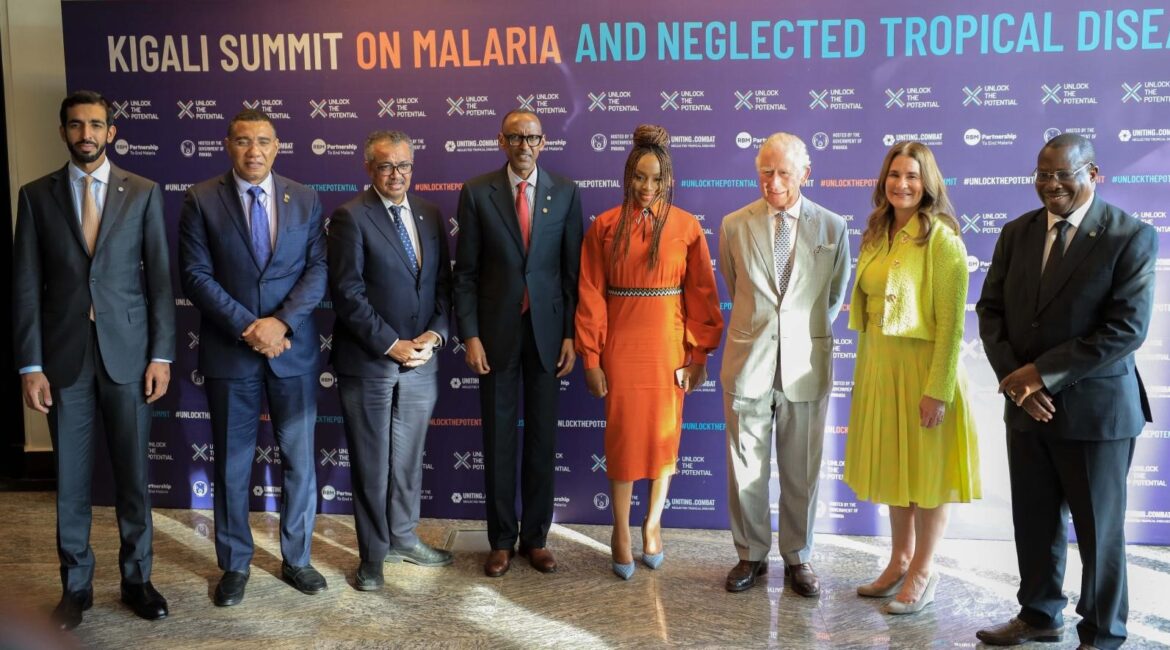By Haruna Gimba
Global leaders led by African Heads of State have announced the first in a series of pledges to accelerate progress against malaria and neglected tropical diseases (NTDs) at the historic Kigali Summit on Malaria and Neglected Tropical Diseases (NTDs).
Hosted by President of the Republic of Rwanda, Paul Kagame, the Kigali Summit featured commitments totalling more than $4 billion, including funding from governments, international organisations, philanthropists, and private sector support.
In addition, 18 billion tablets have been donated by pharmaceutical companies for preventing and treating NTDs.
According to report, it was the first ever joint malaria and NTDs summit with Heads of State hosted on the African continent.
The event was attended by world leaders including The Prince of Wales, Mokgweetsi Masisi, President of the Republic of Botswana, Andrew Holness, Prime Minister of Jamaica, Dr Philip Isdor Mpango, Vice President of the United Republic of Tanzania, Sheikh Shakhboot bin Nahyan Al Nahyan, Minister of State, UAE and the Dr Osagie Ehanire, the Minister of Health, Federal Republic of Nigeria.
The summit took place alongside the Commonwealth Heads of Government Meeting, held in Rwanda.
The summit is a response to the urgent threat of a resurgence in malaria and NTDs made worse by a plateauing of funding, biological challenges and the COVID-19 pandemic, following many years of progress.
The endemic countries delivered robust pledges at the Summit to demonstrate leadership and action to accelerate progress towards eliminating these diseases by 2030 and galvanise political will.
“Malaria and NTD affected countries committed over $2.2 billion in domestic resources towards ending these diseases. These commitments were made in the context of both the Kigali Declaration for NTDs launched today, and a signal of further enhanced domestic resource commitments for malaria at the forthcoming Global Fund replenishment,” a statement from the summit issued to newsmen said.
“With endemic countries demonstrating their leadership and ownership in the fight against malaria and NTDs, now is the time for international solidarity to ensure we all work together across all partners and levels to meet the ambitious targets.”
President Paul Kagame, ensuring that all African countries mobilise the domestic financial resources required for quality healthcare, “is a priority for the African Union, and our partners.
“If there is one thing the pandemic has taught us, it is that together, through coordinated and collaborative action, we can achieve much more.”
Countries called on other global leaders to join them and demonstrate their support by endorsing and committing resources to the Kigali Declaration on NTDs and mobilising at least $18 billion for the malaria response at the Global Fund’s Seventh Replenishment Conference in September.
In his speech, The Prince of Wales, Prince Charles, stated that while the world achieved so much in the malaria campaign since 2000, “I am afraid that largely due to the COVID-19 pandemic there remains a great amount to do if our ambitions are to be met.
“I can only hope that today’s meeting signals the necessary focus, and prioritization, of funding for novel therapeutic, prophylactic, and vaccine strategies against malaria.
“For example, I understand that the Global Fund to Fight AIDS, Tuberculosis and Malaria reported that 188 million mosquito nets were distributed in 2020 – a 17 per cent increase compared to 2019, despite COVID-19.
“And there is a wider hope – we now have more valuable assets at our disposal than ever before. For example, the first World Health Organisation (WHO) approved vaccine, new nets and modern communications tools to monitor our progress and fight against complacency,” he said.
Prince Charles added that it is encouraging to see that leaders of the Commonwealth will discuss and pledge their support for the campaign and are committed to work towards ending the epidemic of malaria by 2030. “I very much welcome this determination and that we are not turning our back on a job unfinished.”


